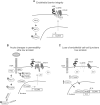The apical junctional complex in respiratory diseases
- PMID: 24855600
- PMCID: PMC4022791
- DOI: 10.4068/cmj.2014.50.1.1
The apical junctional complex in respiratory diseases
Abstract
The epithelium, including the respiratory system, acts as a selective gate between the outside environment and underlying tissue. Epithelial cells are polarized due to the formation of the apical junctional complex, which includes adherent junctions and tight junctions. Endothelial cells are one of the most important cellular constituents of blood vessels. Endothelial junctional proteins play important roles in tissue integrity as well as in vascular permeability, leukocyte extravasation, and angiogenesis. This review focuses on the apical junctional complex in respiratory diseases.
Keywords: Epithelium; Permeability; Tight junctions.
Conflict of interest statement
None declared.
Figures


References
-
- Tsukita S, Furuse M, Itoh M. Multifunctional strands in tight junctions. Nat Rev Mol Cell Biol. 2001;2:285–293. - PubMed
-
- Dejana E. Endothelial cell-cell junctions: happy together. Nat Rev Mol Cell Biol. 2004;5:261–270. - PubMed
-
- Wallez Y, Huber P. Endothelial adherens and tight junctions in vascular homeostasis, inflammation and angiogenesis. Biochim Biophys Acta. 2008;1778:794–809. - PubMed
-
- Miyoshi J, Takai Y. Molecular perspective on tight-junction assembly and epithelial polarity. Adv Drug Deliv Rev. 2005;57:815–855. - PubMed
-
- Matter K, Balda MS. Signalling to and from tight junctions. Nat Rev Mol Cell Biol. 2003;4:225–236. - PubMed
Publication types
LinkOut - more resources
Full Text Sources
Other Literature Sources

